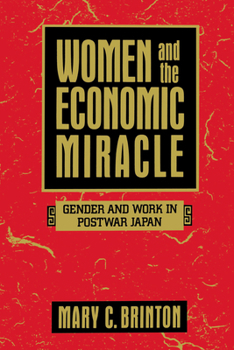Women and the Economic Miracle: Gender and Work in Postwar Japan Volume 21
(Part of the California Series on Social Choice and Political Economy Series)
Select Format
Select Condition 
Book Overview
This lucid, hard-hitting book explores a central paradox of the Japanese economy: the relegation of women to low-paying, dead-end jobs in a workforce that depends on their labor to maintain its status as a world economic leader. Drawing upon historical materials, survey and statistical data, and extensive interviews in Japan, Mary Brinton provides an in-depth and original examination of the role of gender in Japan's phenomenal postwar economic growth.
Brinton finds that the educational system, the workplace, and the family in Japan have shaped the opportunities open to female workers. Women move in and out of the workforce depending on their age and family duties, a great disadvantage in a system that emphasizes seniority and continuous work experience. Brinton situates the vicious cycle that perpetuates traditional gender roles within the concept of human capital development, whereby Japanese society "underinvests" in the capabilities of women. The effects of this underinvestment are reinforced indirectly as women sustain male human capital through unpaid domestic labor and psychological support.
Brinton provides a clear analysis of a society that remains misunderstood, but whose economic transformation has been watched with great interest by the industrialized world.
Brinton finds that the educational system, the workplace, and the family in Japan have shaped the opportunities open to female workers. Women move in and out of the workforce depending on their age and family duties, a great disadvantage in a system that emphasizes seniority and continuous work experience. Brinton situates the vicious cycle that perpetuates traditional gender roles within the concept of human capital development, whereby Japanese society "underinvests" in the capabilities of women. The effects of this underinvestment are reinforced indirectly as women sustain male human capital through unpaid domestic labor and psychological support.
Brinton provides a clear analysis of a society that remains misunderstood, but whose economic transformation has been watched with great interest by the industrialized world.
Format:Paperback
Language:English
ISBN:0520089200
ISBN13:9780520089204
Release Date:October 1994
Publisher:University of California Press
Length:320 Pages
Weight:0.45 lbs.
Dimensions:0.8" x 6.0" x 8.9"
Customer Reviews
1 rating
Brinton's Strong Analysis
Published by Thriftbooks.com User , 24 years ago
Brinton's strong analysis of the current situation of Japanese women in the workplace is a perfect mix of economic data and sociological evidence. Her prose is excepetional. Anyone looking for insight into the labor market in Japan should look no further.






